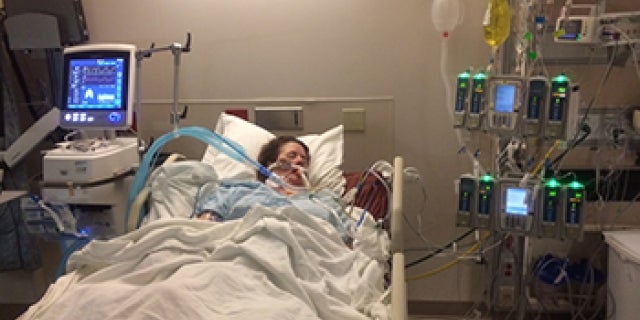
Peggy Medina, 63, has suffered from bouts of pancreatitis for 12 years. When she began experiencing abdominal pain and nausea in February, Peggy reached for the pain medication to get her through a few days of rest and pain management – what had worked in the past. “The pain was so bad the meds didn’t impact it,” recalls Peggy. She quickly decided it was time to go to the Emergency Department at Hillcrest South.
After undergoing a CT scan and blood work, Peggy was admitted for high triglyceride levels. Her condition worsened. “That’s the last thing I remember,” she adds. “I woke up 10 days later in the ICU.”
Family from across the country came to Peggy’s bedside as doctors and nurses worked to treat the severe pancreatitis, while Peggy was under a medically induced coma. Though it is not common, acute severe pancreatitis can be a fatal condition for 5 percent of those affected. “They thought I was going to die,” says Peggy of later learning her husband and children gathered daily at her bedside.
The mother of four was experiencing her worst bout of pancreatitis in more than a decade. While she lay in the ICU, nursing staff realized she had developed a blood clot in the picc line and suffered a heart attack. Further testing revealed she had 90 percent and 95 percent blockages in two arteries.
Peggy and her family had no idea she was living with heart disease.
“They saved my life,” Peggy says of the ICU staff that cared for her. “They really truly saved my life – the nurses, as well as the doctors. They stayed on top of my condition and never left my side. They caught the blood clot and heart attack. It was one of those hidden things they wouldn’t have found until it was too late.”
Two months to the day Peggy arrived at the ED at Hillcrest South, she arrived at Oklahoma Heart Institute for a quadruple bypass surgery with thoracic surgeon Dr. Paul Kempe. Peggy says Dr. Kempe explained the procedure and made her feel at ease. “I trusted him completely,” she says.
Admitted for pancreatitis, Peggy’s hospitalization revealed an underlying life-threatening condition. She was in the right place, at the right time. “Their care is why I survived,” she says with confidence.
